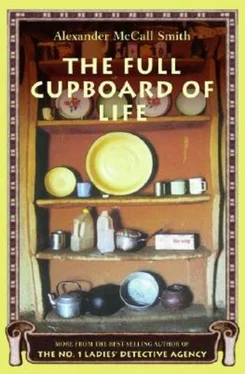Alexander Smith - The Full Cupboard of Life
Здесь есть возможность читать онлайн «Alexander Smith - The Full Cupboard of Life» весь текст электронной книги совершенно бесплатно (целиком полную версию без сокращений). В некоторых случаях можно слушать аудио, скачать через торрент в формате fb2 и присутствует краткое содержание. Жанр: Триллер, на английском языке. Описание произведения, (предисловие) а так же отзывы посетителей доступны на портале библиотеки ЛибКат.
- Название:The Full Cupboard of Life
- Автор:
- Жанр:
- Год:неизвестен
- ISBN:нет данных
- Рейтинг книги:4 / 5. Голосов: 1
-
Избранное:Добавить в избранное
- Отзывы:
-
Ваша оценка:
- 80
- 1
- 2
- 3
- 4
- 5
The Full Cupboard of Life: краткое содержание, описание и аннотация
Предлагаем к чтению аннотацию, описание, краткое содержание или предисловие (зависит от того, что написал сам автор книги «The Full Cupboard of Life»). Если вы не нашли необходимую информацию о книге — напишите в комментариях, мы постараемся отыскать её.
The Full Cupboard of Life — читать онлайн бесплатно полную книгу (весь текст) целиком
Ниже представлен текст книги, разбитый по страницам. Система сохранения места последней прочитанной страницы, позволяет с удобством читать онлайн бесплатно книгу «The Full Cupboard of Life», без необходимости каждый раз заново искать на чём Вы остановились. Поставьте закладку, и сможете в любой момент перейти на страницу, на которой закончили чтение.
Интервал:
Закладка:
Mma Ramotswe had no particular reason to go up to Mochudi, but it was the village in which she had grown up and one never really needed an excuse to visit the place in which one had spent one’s childhood. That was the marvellous thing about going back to one’s roots; there was no need for explanation. In Mochudi everybody knew who she was: the daughter of Obed Ramotswe, who had gone off to Gaborone, where she had made a bad marriage to a trumpet player she had met on a bus. That was all common knowledge, part of the web of memories which made up the village life of Botswana. In that world, nobody needed to be a stranger; everybody could be linked in some way with others, even a visitor; for visitors came for a reason, did they not? They would be associated, then, with the people whom they were visiting. There was a place for everybody.
Mma Ramotswe had been thinking a great deal recently about how people might be fitted in. The world was a large place, and one might have thought that there was enough room for everybody. But it seemed that this was not so. There were many people who were unhappy, and wanted to move. Often they wished to come to the more fortunate countries-such as Botswana-in order to make more of their lives. That was understandable, and yet there were those who did not want them. This is our place, they said; you are not welcome.
It was so easy to think like that. People wanted to protect themselves from those they did not know. Others were different; they talked different languages and wore different clothes. Many people did not want them living close to them, just because of these differences. And yet, they were people, were they not? They thought the same way, and had the same hopes as anybody else did. They were our brothers and sisters, whichever way you looked at it, and you could not turn a brother or sister away.
Mochudi was busy. There was to be a wedding at the Dutch Reformed Church that afternoon, and the relatives of the bride were arriving from Serowe and Mahalapye. There was also something happening at one of the schools-a sports day, it seemed-and as she passed the field (or patch of dust, she noted ruefully) a teacher in a green floppy hat was shouting at a group of children in running shorts. Ahead of her on the road a couple of donkeys ambled aimlessly, flicking at the flies with their moth-eaten tails. It was, in short, a typical Mochudi Saturday.
Mma Ramotswe went to her cousin’s house and sat on a stool in the lelapa, the small, carefully swept yard which forms the immediate curtilage of the traditional Botswana house. Mma Ramotswe was always pleased to see her cousin, as these visits gave her the opportunity to catch up on village news. This was information one would never see in any newspaper, yet it was every bit as interesting-more so, in many respects-than the great events of the world which the newspapers reported. So she sat on a traditional stool, the seat of which was woven from thin strips of rough-cured leather, and listened to her cousin tell her what had taken place. Much had happened since Mma Ramotswe’s last visit. A minor headman, known for his tendency to drink too much beer, had fallen into a well, but had been saved because a young boy passing by had happened to mention that he had seen somebody jump into the well.
“They almost didn’t believe that boy,” said the cousin. “He was a boy who was always telling lies. But happily somebody decided to check.”
“That boy will grow up to be a politician,” said Mma Ramotswe. “That will be the best job for him.”
The cousin had shrieked with laughter. “Yes, they are very good at lying. They are always promising us water for every house, but they never bring it. They say that there are not enough pipes. Maybe next year.”
Mma Ramotswe shook her head. Water was the source of many problems in a dry country and the politicians did not make it any easier by promising water when they had none to deliver.
“If the opposition would only stop arguing amongst themselves,” the cousin went on, “they would win the election and get rid of the government. That would be a good thing, do you not think?”
“No,” said Mma Ramotswe.
The cousin stared at her. “But it would be very different if we had a new government,” she said.
“Would it?” asked Mma Ramotswe. She was not a cynical woman, but she wondered whether one set of people who looked remarkably like another set of people would run things any differently. But she did not wish to provoke a political argument with her cousin, and so she changed the subject by asking after the doings of a local woman who had killed a neighbour’s goat because she thought that the neighbour was flirting with her husband. It was a long-running saga and was providing a great deal of amusement for everyone.
“She crept out at night and cut the goat’s throat,” said the cousin. “The goat must have thought she was a tokolosh, or something like that. She is a very wicked woman.”
“There are many like that,” said Mma Ramotswe. “Men think that women can’t be wicked, but we are quite capable of being wicked too.”
“Even more wicked than men,” said the cousin. “Women are much more wicked, don’t you agree?”
“No,” said Mma Ramotswe. She thought that the levels of male and female wickedness were about the same; it just took slightly different forms.
The cousin looked peevishly at Mma Ramotswe. “Women have not had much of a chance to be wicked in a big way,” she muttered. “Men have taken all the best jobs, where you can be truly wicked. If women here were allowed to be generals and presidents and the like, then they would be very wicked, same as all those wicked men. Just give them the chance. Look at how those lady generals have behaved.”
Mma Ramotswe picked up a piece of straw and examined it closely. “Name one,” she said.
The cousin thought, but no names came to her, at least no names of generals. “There was an Indian lady called Mrs Gandhi.”
“And did she shoot people?” asked Mma Ramotswe.
“No,” said the cousin. “Somebody shot her. But…”
“There you are,” said Mma Ramotswe. “I assume that it was a man who shot her, or was it some lady, do you think?”
The cousin said nothing. A small boy was peering over the wall of the lelapa, staring at the two women. His eyes were large and round, and his arms, which protruded from a scruffy red shirt, were thin. The cousin pointed at him.
“He cannot speak, that little boy,” she said. “His tongue does not work properly. So he just watches the other children play.”
Mma Ramotswe smiled at him, and called out to him gently in Setswana. But the little boy might not have heard, for he turned away without replying and walked slowly away on his skinny legs. Mma Ramotswe was silent for a moment, imagining what it would be like to be a little boy like that, thin and voiceless. I am fortunate, she thought, and turned to say to her cousin, “We are lucky, aren’t we? Here we are, traditionally built ladies, and there’s that poor little boy with his thin arms and legs. And we can talk and he can make no sound at all.”
The cousin nodded. “We are very lucky to be who we are,” she said. “We are fortunate ladies, sitting here in the sun with so much to talk about.”
So much to talk about-and so little to do. Here in Mochudi, away from the bustle of Gaborone, Mma Ramotswe could feel herself lapsing again into the rhythms of country life, a life much slower and more reflective than life in town. There was still time and space to think in Gaborone, but it was so much easier here, where one might look out up to the hill and watch the thin wisps of cloud, no more than that, float slowly across the sky; or listen to the cattle bells and the chorus of the cicadas. This was what it meant to live in Botswana; when the rest of the world might work itself into a frenzy of activity, one might still sit, in the space before a house with ochre walls, a mug of bush tea in one’s hand, and talk about very small things: headmen in wells, goats and jealousy.
Читать дальшеИнтервал:
Закладка:
Похожие книги на «The Full Cupboard of Life»
Представляем Вашему вниманию похожие книги на «The Full Cupboard of Life» списком для выбора. Мы отобрали схожую по названию и смыслу литературу в надежде предоставить читателям больше вариантов отыскать новые, интересные, ещё непрочитанные произведения.
Обсуждение, отзывы о книге «The Full Cupboard of Life» и просто собственные мнения читателей. Оставьте ваши комментарии, напишите, что Вы думаете о произведении, его смысле или главных героях. Укажите что конкретно понравилось, а что нет, и почему Вы так считаете.












